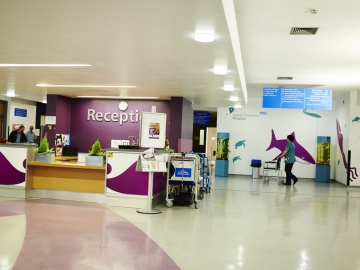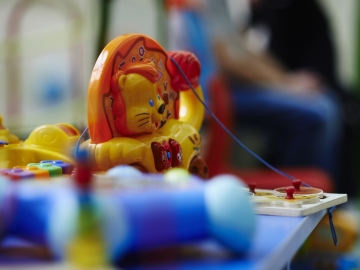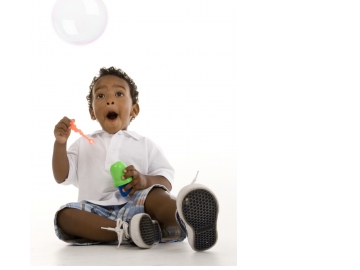Child
- About
- Meet The Team
- Conditions
- Dental Practitioners: Dental care in children at risk of Infective Endocarditis
- Looking after your child’s oral health
- Coming for an echocardiogram
- Outpatient Appointments
- Preparing to Come into Hospital for Surgery
- On Admission to the Children's Ward
- Visiting
- Operation Day
- Children's Intensive Care
- Daily Routine on Intensive Care
- Managing your child's discomfort
- Going Home
- Children's Cardiac MRI Scan
- Cardiac Catheter
- Reveal Device
- Ablation Procedure
- Pacemakers
- INR and Warfarin
- Lifestyle and Exercise Advice
- School Advice
- Attachment
- Yorkshire Regional Genetic Service
- Advice & Support Groups
- Your Views
- Monitoring of Results
- Second Opinion
Operation Day
-
The play specialists on the ward will offer procedural preparation to provide appropriate information for your children before they have their operation. Preparation gives children and young people the opportunity to ask questions and talk about any worries they may have. It has been proven that when children have an understanding, of what is happening, they cope better emotionally. If you would like to know more about what and how we can prepare your child, please talk to the play specialists, who would be happy to discuss this further with you.
-
What happens on the day?
• For several hours before the operation your child will need to fast (not eat or drink anything). Your nurse will give you the time you child needs to fast from.
• Your child will need to have a wash and put on pyjamas or a gown.
• So medication can be given in theatre a local anaesthetic cream may be applied to the area where an intravenous drip will be sited.
• If the anaesthetist feels it is necessary your child may be given medicine to make them sleepy and less worried.
• When it is time for the operation your nurse will accompany you and your child to the anaesthetic room.
• After the operation your child will be nursed on the Paediatric Intensive Care Unit (ward 47) until they are well enough to come back to the cardiac ward.
-

Helping your child when having treatment or procedures
Distraction is one of the techniques used to help you and your child cope with pain and anxiety. Distraction is not a way of solely diverting the child’s attention away from the procedure, it is about fully engaging the child in an activity so they are less aware of the procedure, therefore less aware of any possible pain and, in turn, less anxious.
Distraction provides fun control and understanding of children’s emotions and feelings. It allows children to understand their treatment with a clear explanation.
-
Here are some reasons as to why distraction techniques are widely used and often very successful:
• it may help you/your child understand pain
• it may help take your child’s mind off the thought of pain
• it helps you/your child to be absorbed in a particular activity
• it helps you/your child relax
• it gives an opportunity for choice, control and positive involvementThrough research it appears a child will not cope with pain effectively alone. Therefore distraction therapy must be interactive with an adult. It is not sufficient to leave a child with a book, toy or just music to listen to. If possible allow your child to choose a coping technique, with the help of an adult who will be able to give you ideas to age appropriate toys, games or activities.
We aim to offer many different distraction techniques to help you/your child cope with the treatment or procedure they are having. As much as possible we like you/your child to choose the coping strategy. -

Simple distraction and coping techniques
Games and exercises which encourage controlled breathing
Blowing bubbles, balloons, and party blowers, blowing feathers or an imaginary balloon.
Books
Pop up books, “Where’s Wally” books, puzzle books, hospital books
Games and Puzzles
Hand held American football or tank game (battery operated), small puzzles, I spy games, iPad/ iPod
Music
Relaxation tapes, singing, musical toys and instruments
Sensory Experiences
Koosh balls, pom poms, stress ball, light wand, kaleidoscope, cuddly toys Messy substances – cornflower, playdough, slime jelly
Mental Aptitude
Logical thinking games, mental maths games (counting, multiplication), jokes, positive interaction/conversation
Imaginary and Make Believe Play
Puppets, favourite soft toy, therapeutic dolls, imaginary journeysPlease do not hesitate to ask the Play Specialists, if you would like any more information or if you feel your child may need some distraction during any treatments or procedures.
